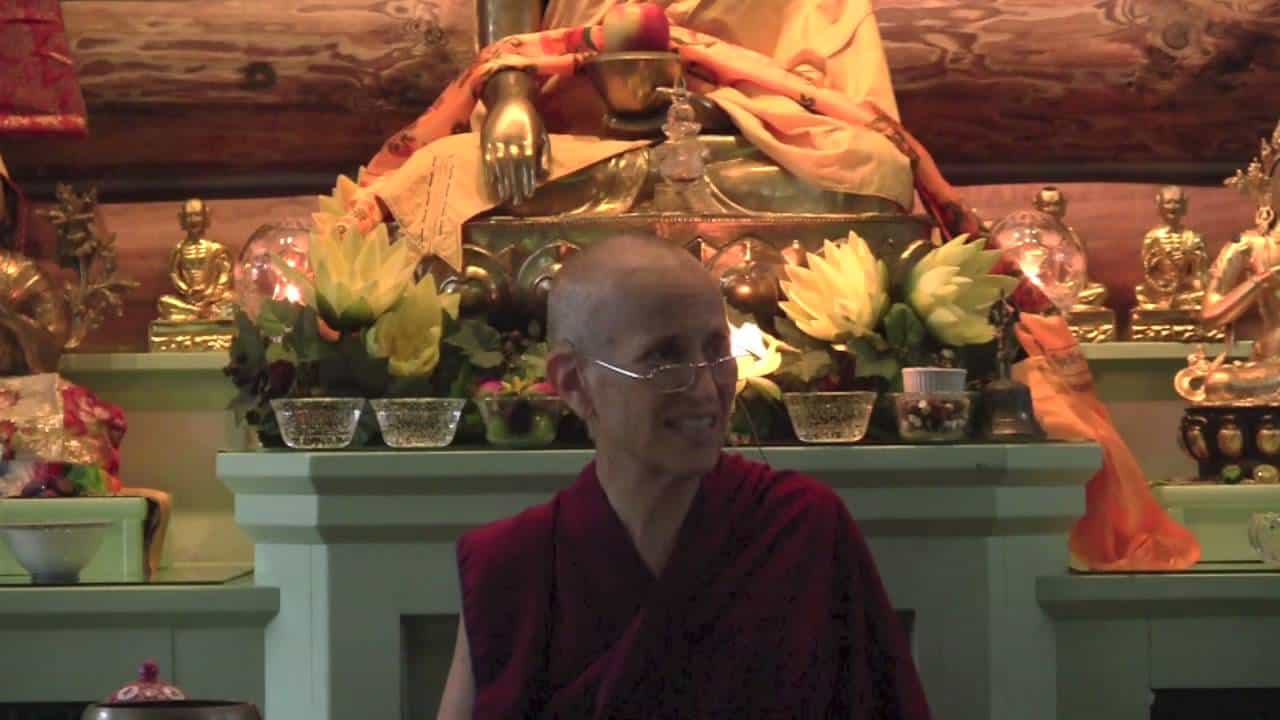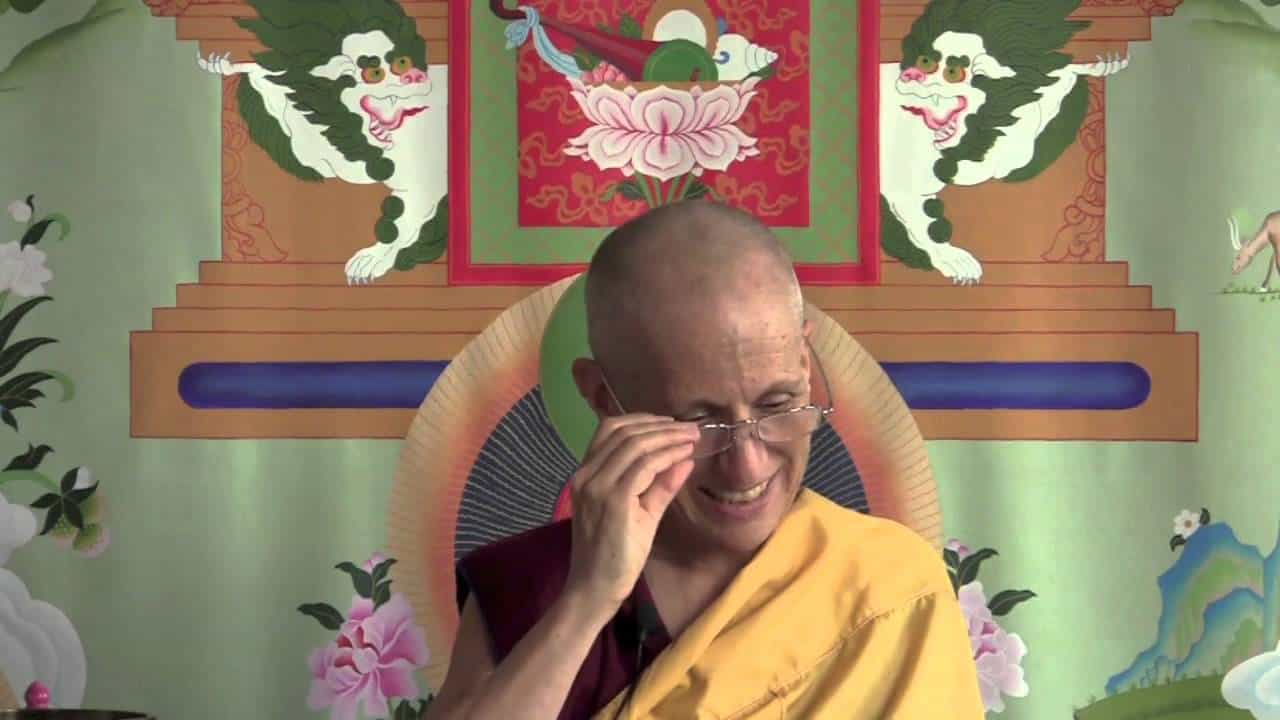Verse 47: The great fault
Verse 47: The great fault
Part of a series of talks on Gems of Wisdom, a poem by the Seventh Dalai Lama.
- The self-centered mind opens the door to negative actions
- Being able to see and admit to our faults gives us space for growth
- We need to habituate ourselves with the wisdom that sees the disadvantages of the self-centered attitude
Gems of Wisdom: Verse 47 (download)
What is the great fault that opens the door to all negative qualities?
Holding oneself more precious than others, a characteristic of lowly beings.
Anybody besides me volunteer to fit this description? [laughter]
How does “holding oneself more precious than others” open the door to all negative qualities?
-
To protect the self, to help the self get what we want, then every other affliction arises. “I want happiness” or:
-
“I need this, I need that, I deserve it more than other people do….”
-
“This person got in the way of my happiness I can’t stand them I’ve got to attack them and get rid of them….”
-
“I’m jealous of so-and-so because they have something and actually I should have it the universe owes it to me….”
-
“I’m proud because of what I achieved and I’m so great….”
-
“And when I’m lazy it’s just all okay and there’s no problem….”
-
“And when I lack integrity, you know….” I mean, why have integrity when my goal is to get everything I want? There’s no space in there for integrity or for consideration for others, because it is all about ME, the center of the universe.
That attitude opens the door to all negative qualities, which opens the door to all negative actions.
On one level we can look, and in our meditation we can see this. If you meditate it becomes quite obvious. But then it’s like, “But if I don’t stick up for myself, who is going to stick up for me?” Remember when you heard that as a kid? And you’ve got to stick up for yourself. And, “Not everything I want is selfish!” And just this thing of intellectual “yes yes, self-centeredness is misplaced.” But gut feeling is like “if I’m not self-centered then people are going to run all over me.” “They’re going to take advantage of me, they’re going to abuse me, they’re going to lie about me behind other people’s back…. I’ve got to stick up for myself and get what I want. Because nobody else is going to give me what I want but me. And I need that.”
There are these two sides of us: one side that completely understands this verse; and the other side that says, “But but but but but….”
This produces a little bit of tension within ourselves…. [laughter] Yes?
And then we get really involved in this tension: “Oh I’m so confused. Is it good to be selfish? Is it not good to be selfish? Oh it’s lousy to be selfish, I’m so bad, I’m so guilty because I’m so selfish. This is terrible no wonder I’m a disaster and nobody loves me…. Because I am so selfish…. But if I stop being selfish then they’re all going to take advantage of me and I’m not going to achieve anything I want….” And then we just go around and round and round in circles about this. Don’t we? “Do I say something? Because if I say something, it’s selfish. If I don’t say something then that’s also selfish because I’m wanting to look like a good Buddhist….” Yes, you know that one? It’s like, “Oh, I can’t say what I really want because then I won’t look like a good Buddhist, so I’ve got to be quiet and humble and make sure that everybody else is taken care of and then figure out how to get what I want without, of course, looking like I’m trying to get what I want, or even acknowledging it to myself.”
Oh, samsara is so confusing, isn’t it?
This is the “characteristic of lowly beings.” Why “lowly beings?” Does part of your mind say “I’m not a lowly being! I’m not a lowly being just because I think like this.”
Audience: If we had any wisdom, once we saw it we’d actually be able to stop it.
Venerable Thubten Chodron: Well, it’s not just a question of seeing it with wisdom. It’s a question of habituating ourselves with the wisdom.
Maybe what makes it a quality of lowly beings is we don’t put forth the effort to habituate ourselves with understanding the disadvantages of the self-centered thought and the benefits of cherishing others. We understand it here [in our heads], but the habituation that actually makes the transformation, we haven’t engaged in that.
[In response to audience] So what makes it lowly is that we make a big deal out of our own small, tiny whatever; meanwhile, people who have really severe problems we don’t even notice or care about. We’re only concerned about our tiny thing. And so that is a lowly mental state, isn’t it? That’s why we’re called “childish beings.”
[In response to audience] Yes, so self-centeredness is a lowly practice because we don’t see the consequences of our own actions. And we don’t really sit down and think about them. And if people point them out to us we usually deny them because, as you said, we’re always right. So how can there be negative consequences from what I say or what I do when I happen to be right all the time?
[In response to audience] Yes, so also an inability to admit our faults. Or to even consider that we have any. Or to open our minds to consider other people’s perspectives on a situation, or what may be important to them.
So self-centeredness is quite limited and limiting. We can’t see very far with it because it’s all about me.
[In response to audience] Okay, so self-centeredness is about getting what you want and then preserving it forever so there’s no space for change or growth. Or reality, for that matter. It’s about getting my duckies in this row and keeping them in the row. Not realizing that we may want to redesign them ourselves later on. I mean, the mind is so small in the middle of self-centeredness.
[In response to audience] It’s true, if you’re self-centered, and you’re a squeaky wheel, you do get attention.
What she’s referring to is this great skit we did once that was so true it was not a skit at all…. Yes, it was a documentary. [laughter] Maybe we should do it again. Okay?
But it was…. Who was it? Somebody played the monastic. Who was it who played the monastic? Somebody played the monastic and everybody else was the anagarikas. And how the anagarikas—you know, we have our stand-up meeting in the morning—and every morning there’s a complaint from an anagarika. It’s like “I’m too hot,” because the anagarika’s thing has long sleeves. “I’m too hot wearing long sleeves and I can’t do my activities in the summer because of long sleeves, I want the anagarika outfit to have short sleeves.” And then somebody else saying “I don’t like the color.” So we’ve got to change the color. And oh yeah, the buttons. “Don’t like the buttons. These are ugly buttons. Can we have zippers instead,” or “can we have pretty buttons.” And “the fabric is too rough.” And “do I put my jacket on over my anagarika shirt or under my anagarika shirt? Because if I put it under then if I get too warm I have to take it off then I have to go in the bathroom take it off and take my jacket off and take off the shirt and put it back on and that’s just too much of a hassle so I want to keep my jacket on over my anagarika shirt.” [sighs]
Venerable Thubten Chodron
Venerable Chodron emphasizes the practical application of Buddha’s teachings in our daily lives and is especially skilled at explaining them in ways easily understood and practiced by Westerners. She is well known for her warm, humorous, and lucid teachings. She was ordained as a Buddhist nun in 1977 by Kyabje Ling Rinpoche in Dharamsala, India, and in 1986 she received bhikshuni (full) ordination in Taiwan. Read her full bio.


